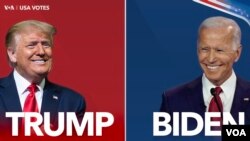Cambodians following the U.S. presidential election on Tuesday were largely ambivalent over their preference between President Donald Trump and Former Vice President Joe Biden and split over who would be better for Cambodia.
Results continue to trickle in for a handful of battleground states in the United States election, with both candidates still having a path to victory. As of Thursday, there is still no clear winner in the keenly-watched contest between the Republican and Democratic parties.
Cambodian observers, politicians, civil society leaders, and students were somewhat split over who they wanted to win, with some wanting a change of leadership in the U.S., while others saying relations with the superpower would remain unchanged regardless of who occupies the White House in Washington D.C.
Chak Sopheap, executive director of the Cambodian Center for Human Rights (CCHR), said the Trump administration did not prioritize the principles of human rights. She added that funds on reproductive health, LGBT rights protection, and other health-related projects have been cut by the current administration.
"I hope there will be a change in which the new administration will prioritize human rights, embrace gender equality, and give more support to the civil society who has worked on promoting democracy and human rights," she said.
Critics have pointed to Donald Trump’s routine attacks against the media and organizations that did not support him or his policies, suggesting that this was eroding press freedoms in the country.
Trump’s use of the term “fake news” to delegitimize media reports he disagreed with was quickly embraced by many other governments, including the Cambodian administration, which has used it to justify their crackdown on freedom of expression and the free press.
The United State used to take media freedoms seriously, said Ith Sothoeuth, media director of the Cambodian Center for Independent Media (CCIM), but was retreating from its support for the free press overseas.
“Their press freedom is legally protected by the First Amendment. But, the [Trump] administration frequently protested against many media, and cut its funding for the media [in developing countries],” he said.
Ou Virak, the president of the think tank Future Forum, said both parties would have some common issues when it came to the region, such as the growing presence of China in Southeast Asia through increased investments and military support.
“The differences are their approaches,” he said, “Trump has attacked China more aggressively.”
If Biden wins the election, his approach would more likely follow President Barack Obama’s outlook to the region, Virak said. “Obama’s foreign policy was ‘pivot toward Asia’.”
Relations between the U.S. and Cambodia have been tumultuous in the last few years, especially after the arrest of opposition leader Kem Sokha for allegedly attempting to mount a color revolution with the help of the United State. His party was also dissolved, leading to the ruling party to win all parliamentary seats in 2018, a result condemned by the United States.
There has been some reconciliation after the appointment of new U.S. Ambassador W Patrick Murphy. In November 2019, Cambodian Prime Minister Hun Sen exchanged letters with Donald Trump, thanking the latter for not seeking “regime change” in Cambodia.
Government spokesman Phay Siphan did not want to comment on the U.S. election because it would interfere with another country’s politics. However, he said that a change in the U.S. presidency would not have a significant impact on Cambodia-U.S. relations.
“Although there was [strong] political rhetoric about human rights or democracy, cooperation between the two nations is still growing, isn’t it?” he said.
“We see trade is still increasing, other [business] sectors are still growing. It actually depends on how much money the U.S. has for spending on foreign affairs. And, that’s it.”
Sok Eysan, the spokesperson of the ruling party CPP, said Cambodia will respect the decision of the American people, adding that whoever wins the election relations between the two countries should remain the same.
“The election is a domestic affair of the U.S., and the American people can vote for who serves their interests best,” Sok Eysan said. “However, the outcome would affect global affairs—peace and stability.”
The U.S. election process was also closely watched by Cambodian students studying international politics.
Chanchem Vichny, 20, who studies political sciences and international relations at Paragon International University, said the fact that U.S. politicians can criticize their opponents from the ruling party proves that the political space in the United States is free and open.
“So, people everywhere can learn about the party’s policy before they decide who to vote for,” Chanchem Vichny said.







